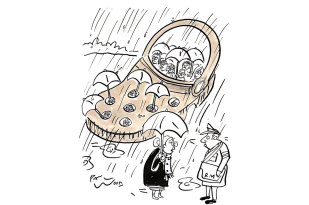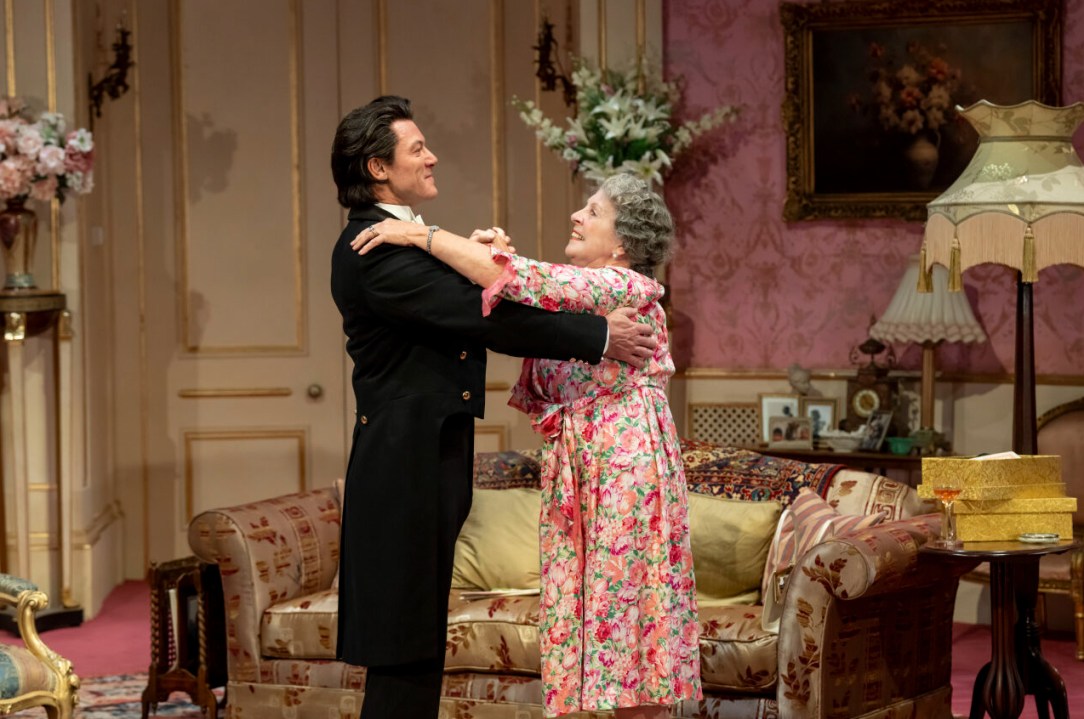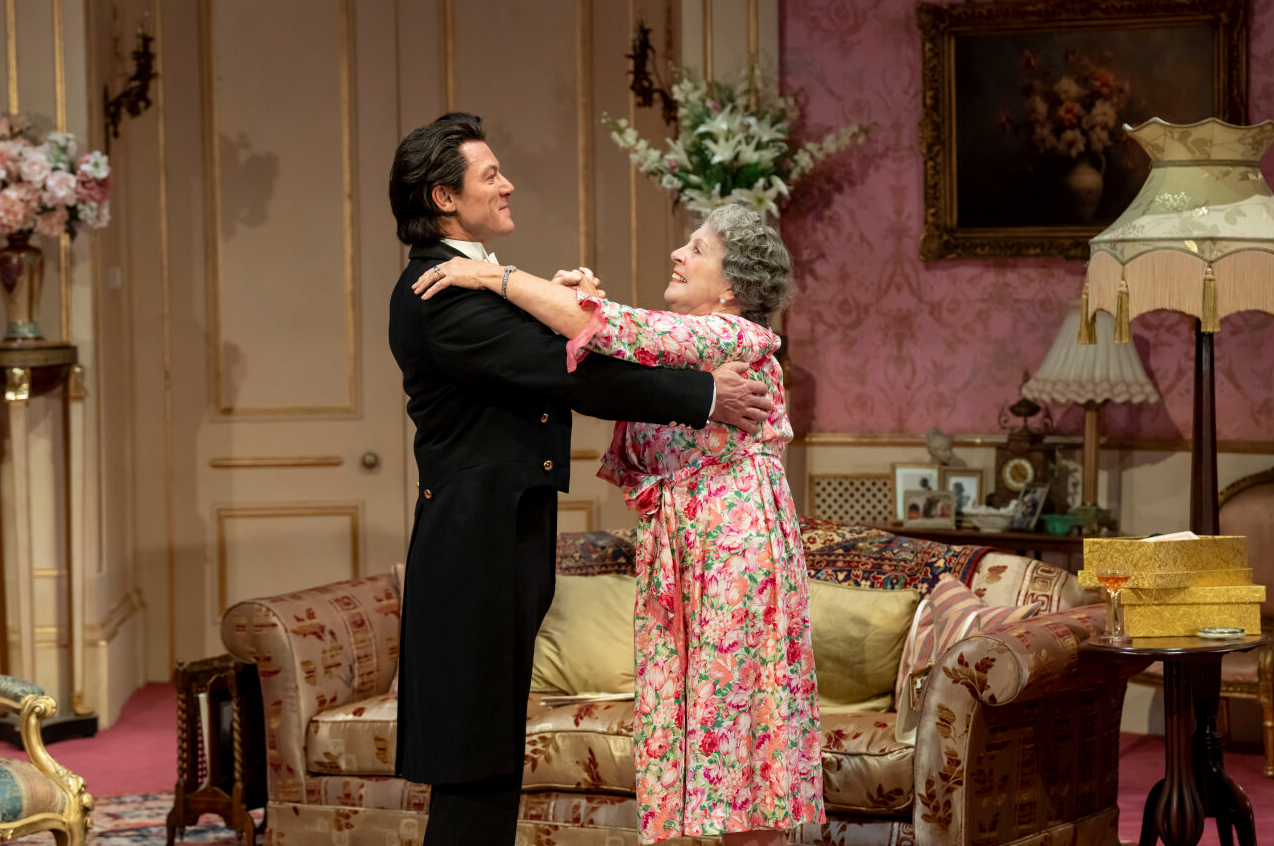Backstairs Billy is a biographical comedy about William Tallon, who worked as the Queen Mother’s chief footman for years following the death of George VI in 1952. Tallon was an enthusiastic gay cottager whom the tabloids suggestively dubbed ‘backstairs Billy’ during the 1970s when attitudes to homosexuality were growing more enlightened.
The show, directed by Michael Grandage, is set in 1979 and Luke Evans plays Billy as a swaggering charismatic stud who loves his role as the unofficial head of the Queen Mum’s household. He adores his employer, ‘the last Empress of India’, and he praises her decision to remain in London during the Blitz rather than decamping to safety in the countryside or overseas.
The only thing that will close this show is a transfer to Broadway
New staff members are given a crash course in the history of royal palaces – ‘you’ll open doors that are older than democracy’. And they’re invited to take part in the house’s free-and-easy sexual culture. Penelope Wilton plays the Queen Mum as a frolicsome old dear, always keen to throw back another gin and tonic, and determined to have a good time during her twilight years. For decades she had nothing to do but wave at the crowds in public and to mourn the King-Emperor in private.
Wilton delivers a warm and richly detailed portrait of grief overcome by resilience and good humour. The show sags a bit in the middle. There’s a lengthy historical detour about Billy’s adoption by the royal household at the age of 15. Then the script warms up again, and things become farcical rather than factual.
Billy smuggles his sculptor boyfriend, Ian, into Clarence House and they enjoy a spot of luxury love-making on the embroidered cushions. Then they get caught with their pants down and Ian has to pose as a foreign prince in order to justify his presence at the royal residence. He manages to survive an audience with the Queen Mum and a gaggle of her guests. But, without warning, the scene changes gear and Ian starts to rant about the unexplained death of a protestor at an anti-racism march in 1979.
Few in the audience are likely to remember the name Blair Peach and this half-forgotten controversy doesn’t earn its place in an effervescent comedy of manners. And there’s a sight gag about a plastic sex toy which fails to deliver because the punchline is signalled too far in advance.
Minor blemishes aside, this is a glorious evening’s entertainment. The script by Marcelo Dos Santos sparkles with subtle humour and wit. And it’s heartening to see some serious money being been lavished on costumes, props, furnishings and wigs. And there’s a bonus. The design of Clarence House closely matches the fabrics and the colour scheme of the theatre itself so the play really feels like an ‘immersive’ experience. Viewers can imagine that they’re courtiers or guests at the palace and not just immobile observers watching a confected exhibition. Fans of 1970s fashion will drool at the delights on offer: Crimplene flares, Cuban heels and colourful T-shirts bursting at the seams. If you add the irresistible theme of royalty in distress, you have a sure-fire hit. The only thing that will close this show is a transfer to Broadway.

England & Son is a meditation on addiction, rehabilitation and crime. The show opens with Mark Thomas, the comic and activist, describing his experiences among addicts in Manchester. Without mocking the patients, he delivers a series of deft theatrical portraits that give a flavour of the weekly meetings.
One thing is clear: these people are starved of attention. What they want is to play-act in public and to win the applause of other human beings. In fact, it seems that the ritual known as ‘recovery’ may be a handy conceit that enables groups of self-appointed ‘survivors’ to establish the public platform they need. Why else would they show up each week and perform the same old routines for audiences of volunteers? They haven’t failed as human beings. They’re just hopeless as stand-up comedians.
The second part of the evening is a one-man play performed by Thomas and written by Ed Edwards, about a brutalised loser named England. He endures a hideous childhood and falls into the hands of a pretentious socialite, Martha. She offers to become his foster-mum and smokes drugs in front of him while turning a blind eye to his habit of stealing valuables from their neighbours’ homes.
England, it becomes clear, is a man of exceptional talent whose criminal activities furnish him with a compendious knowledge of antiques and sculptures. He could easily turn this expertise into a lucrative career at an auction house or as a specialist collector in his own right. But no one seems to recognise his rare abilities. Not even the playwright. England’s fate rings horribly true: his life has been destroyed by a system that was designed to make him prosperous and useful. What a gruesome ordeal.








Comments